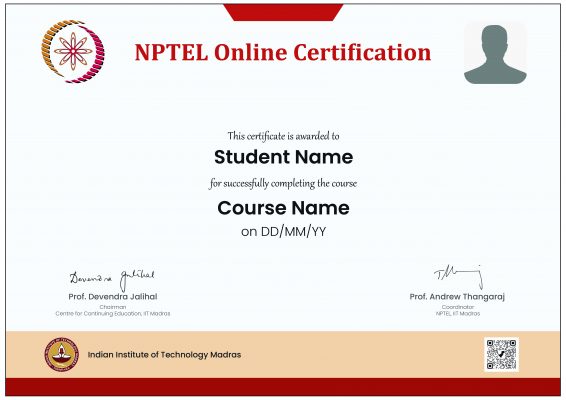Description
This course is an introduction to programming and problem solving in Python. It does not assume any prior knowledge of programming. Using some motivating examples, the course quickly builds up basic concepts such as conditionals, loops, functions, lists, strings and tuples. It goes on to cover searching and sorting algorithms, dynamic programming and backtracking, as well as topics such as exception handling and using files. As far as data structures are concerned, the course covers Python dictionaries as well as classes and objects for defining user defined datatypes such as linked lists and binary search trees.
INTENDED AUDIENCE
Students in any branch of mathematics/science/engineering, 1st year
PREREQUISITES
School level mathematics.
ABOUT THE INSTRUCTOR
Madhavan Mukund studied at IIT Bombay (BTech) and Aarhus University (PhD). He has been a faculty member at Chennai Mathematical Institute since 1992, where he is presently Professor and Director. His main research area is formal verification. He has active research collaborations within and outside India and serves on international conference programme committees and editorial boards of journals.
He has served as President of both the Indian Association for Research in Computing Science (IARCS) (2011-2017) and the ACM India Council (2016-2018). He has been the National Coordinator of the Indian Computing Olympiad since 2002. He served as the Executive Director of the International Olympiad in Informatics from 2011-2014.
In addition to the NPTEL MOOC programme, he has been involved in organizing IARCS Instructional Courses for college teachers. He is a member of ACM India’s Education Committee. He has contributed lectures on algorithms to the Massively Empowered Classroom (MEC) project of Microsoft Research and the QEEE programme of MHRD
Certification Process
1. Join the course
Learners may pay the applicable fees and enrol to a course on offer in the portal and get access to all of its contents including assignments. Validity of enrolment, which includes access to the videos and other learning material and attempting the assignments, will be mentioned on the course. Learner has to complete the assignments and get the minimum required marks to be eligible for the certification exam within this period.
COURSE ENROLMENT FEE: The Fee for Enrolment is Rs. 2000 + GST
2. Watch Videos+Submit Assignments
After enrolling, learners can watch lectures and learn and follow it up with attempting/answering the assignments given.
3. Get qualified to register for exams
A learner can earn a certificate in the self paced course only by appearing for the online remote proctored exam and to register for this, the learner should get minimum required marks in the assignments as given below:
CRITERIA TO GET A CERTIFICATE
Assignment score = Score more than 50% in at least 4/6 assignments.
Programming Assignment score = Score more than 50% in at least 10/17 assignments.
Exam score = 50% of the proctored certification exam score out of 100
Only the e-certificate will be made available. Hard copies will not be dispatched."
4. Register for exams
The certification exam is conducted online with remote proctoring. Once a learner has become eligible to register for the certification exam, they can choose a slot convenient to them from what is available and pay the exam fee. Schedule of available slot dates/timings for these remote-proctored online examinations will be published and made available to the learners.
EXAM FEE: The remote proctoring exam is optional for a fee of Rs.1500 + GST. An additional fee of Rs.1500 will apply for a non-standard time slot.
5. Results and Certification
After the exam, based on the certification criteria of the course, results will be declared and learners will be notified of the same. A link to download the e-certificate will be shared with learners who pass the certification exam.
CERTIFICATE TEMPLATE

Course Details
Week 1
Informal introduction to programmin, algorithms and data structures viagcd
Downloading and installing Python
gcd in Python: variables, operations, control flow - assignments, condition-als, loops, functions
Week 2
Python: types, expressions, strings, lists, tuples
Python memory model: names, mutable and immutable values
List operations: slices etc
Binary search
Inductive function denitions: numerical and structural induction
Elementary inductive sorting: selection and insertion sort
In-place sorting
Week 3
Basic algorithmic analysis: input size, asymptotic complexity, O() notation
Arrays vs lists
Merge sort
Quicksort
Stable sorting
Week 4
Dictionaries
More on Python functions: optional arguments, default values
Passing functions as arguments
Higher order functions on lists: map, lter, list comprehension
Week 5
Exception handling
Basic input/output
Handling files
String processing
Week 6
Backtracking: N Queens, recording all solutions
Scope in Python: local, global, nonlocal names
Nested functions
Data structures: stack, queue
Heaps
Week 7
Abstract datatypes
Classes and objects in Python
"Linked" lists: find, insert, delete
Binary search trees: find, insert, delete
Height-balanced binary search trees
Week 8
Effcient evaluation of recursive definitions: memoization
Dynamic programming: examples
Other programming languages: C and manual memory management
Other programming paradigms: functional programming




Reviews
There are no reviews yet.